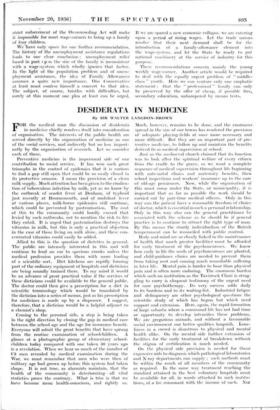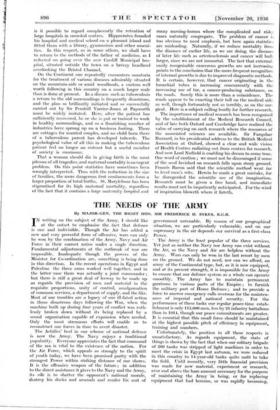DESIDERATA IN MEDICINE
By SIR WALTER LANGDON-BROWN
FOR the medical man the discussion of desiderata in medicine chiefly resolves itself into consideration of organisation. The interests of the public health are served directly by the organisation of medicine as one of the social services, and indirectly but no less import- antly by the organisation of research. Let us consider each of these.
Preventive medicine is the impersonal side of our contribution to social service. It has won such great triumphs in the control of epidemics that it is curious to find a gap still open that could be so easily closed in its protective armour. I mean the provision of a clean milk supply. Much attention has been given to the eradica- tion of tuberculous infection by milk, yet as we know by the outbreak of scarlet fever at Denham, of typhoid just recently at Bournemouth, and of undulant fever at various places, milk-borne epidemics still continue, which could be prevented by pasteurisation. The cost of this to the community could hardly exceed that levied by such outbreaks, not to mention the risk to life they entail. It is urged that pasteurisation destroys the vitamins in milk, but this is only a practical objection in the case of those living on milk alone, and these con- centrated vitamins could easily be added.
Allied to this is the question of dietetics in general. The public are intensely interested in this and will continue to lend an ear to specious cranks unless the medical profession provides them with more leading of a scientific sort. Diet kitchens are rapidly forming part of the ordinary equipment of hospitals and dieticians are being soundly trained there. To my mind it would be an advance of great practical value if the services of these dieticians could be available to the general public.
The doctor could then give a prescription for a diet in scientific terminology which would be translated by the dietician into a series of menus, just as his prescription for medicines is made up by a dispenser. I suggest, therefore, that a dietician would be a helpful adjunct to a chemist's shop.
Coming to the personal side, a step is being taken in the right direction by closing the gap in medical care between the school age and the age for insurance benefit.
Everyone will admit the great benefits that have sprung from the routine examination of schoolchildren. A glance at a photographic group of elementary school- children today compared with one taken 30 years ago is a revelation. When we hear so much of the number of C3 men revealed by medical examination during the War, we must remember that men who were then of military age had grown up before this system had taken shape. It is not true, as alarmists maintain, that the health of the community is deteriorating—all vital statistics prove the contrary. What is true is that we have. become more health-conscious, and rightly so. Much, however, remains to be done, and the enormous spread in the size of our towns has rendered the provision of adequate playing-fields at once more necessary and more difficult. But they are an important part of pre- ventive medicine, to follow up and maintain the benefits derived frcm medical supervision at school.
Just as the mediaeval church claimed that its function was to look after the spiritual welfare of every citizen from the cradle to the grave, so we want a complete sequence of medical supervision throughout life beginning with ante-natal clinics and maternity benefits, then school inspections and workers' insurance up to the care of old-age pensioners. Now, while the organisation of this must come under the State, or municipality, it is important that as far as possible the work should be carried out by part-time medical officers. Only in this way can the patient have a reasonable freedom of choice of doctor, which is essential in such a personal relationship. Only in this way also can the general practitioner be associated with the scheme as he should be if general practice is to continue to attract the right type of man. By this means the sturdy individualism of the British temperament can he reconciled with public control.
Body and mind are so closely linked in the maintenance of health that much greater facilities must be afforded for early treatment of the psychoneuroses. We know how early in life the seeds of psychoncuroses are planted, and child-guidance clinics are needed to prevent them from taking root and causing much remediable suffering in later life. Mental pain is harder to bear than physical pain and is often more enduring. The enormous burden which such an institution as the Tavistock Clinic is strug- gling to carry is eloquent testimony of the urgent need for sane psychotherapy. Its very success adds daily to its burdens and to its waiting-list. Industrial fatigue and delinquency are other psychological questions the scientific study of which has begun but which need support and extension. Here, again, the rapid formation of large suburbs where a communal life has not had time or opportunity to develop intensifies these problems. We are gregarious animals, and without a favourable social environment our better qualities languish. Lone- liness in a crowd is disastrous to physical and mental health alike. On the mental side further extension of facilities for the early treatment of breakdown without the stigma of certification is much needed.
On the physical side provision is needed for those expensive aids to diagnosis which pathological laboratories and X-ray departments can supply ; such methods must be within the reach of all members of the community as required. In the same way treatment reaching the standard attained in the best voluntary hospitals must be available for all, in wards attached to such institu- tions, at a fee consonant with the income of each. Nor is it possible to regard complacently the retention of large hospitals in crowded centres. Hippocrates founded his hospital and medical school on a pleasant island and fitted them with a library, gymnasium and other ameni- ties. In this respect, as in some others, we shall have to return to the methods of the father of medicine, as I reflected on • going _over the new Cardiff Municipal hos- pital, situated outside the town on a breezy headland overlooking the Bristol Channel.
On the Continent one repeatedly encounters sanatoria for the treatment of various diseases admirably situated on the mountain-side or amid woodlands, a custom well worth following in this country on a much larger scale than is done at present. In a disease such as tuberculosis a return to the old' surroundings is frequently disastrous, and the plan so brilliantly initiated and so successfully carried out by Sir Pendrill Varrier-Jones at Papworth must be widely imitated. Here, after the patient has sufficiently recovered, he or she is put or trained to work in healthy surroundings, and so a flourishing number of industries have sprung up on a business footing. There are cottages for married couples, and no child born there of a tuberculous parent has developed tubercle. The psychological value of all this in making the tuberculous patient feel no longer an outcast but a useful member of society is enormous.
That a woman should die in giving birth is the most piteous of all tragedies, and maternal mortality is an urgent problem. On this point statistics have sometimes been wrongly interpreted. Thus with the reduction in the size of families, the more dangerous first confinements form a larger proportion of total births. St. Marylebone has been stigmatised for its high maternal mortality, regardless of the fact that it contains a large maternity hospital and many nursing-homes where the complicated and risky cases naturally congregate. The problem of cancer is too obvious to need emphasis, but here again statistics are misleading. Naturally, if we reduce mortality from the diseases of earlier life, as we are doing, the diseases of later life such as arteriosclerosis and cancer will bulk larger, since we are not immortal. The fact that external, easily recognisable cancerous growths are not increasing points to the conclusion that the more frequent recognition of internal growths is due to improved diagnostic methods. It is certain, however, that cancer originating in the bronchial tubes is increasing concurrently with the increasing use of tar, a cancer-producing substance, on the roads. Surely this is more than a coincidence. The roads appear to be exacting their toll on the medical side as well, though fortunately not so terribly, as on the sur- gical. Here is a subject calling loudly for further research.
The importance of medical research has been recognised by the establishment of the Medical Research Council, and of late both Oxford and Cambridge have realised the value of carrying on such research where the resources of the associated sciences are available. Sir Farquhar Buzzard, in his presidential address to the British Medical Association at Oxford, showed a clear and wide vision of Health Centres radiating out from centres for research. And now Lord Nuffield is enabling his dream to come true. One word of caution ; we must not be discouraged if some of the seed lavished on research falls upon stony ground. Francis Bacon said that the scientific method went far to level men's wits. Herein he made a great mistake, for he disregarded the scientific use of the imagination. Research must be given a free hand, and immediate results must not be impatiently anticipated. For the wind of inspiration bloweth where it listeth.





























































 Previous page
Previous page